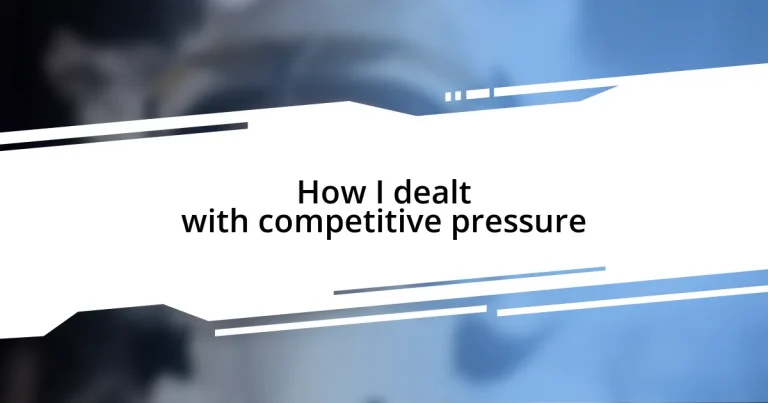Key takeaways:
- Understanding competitive pressure involves recognizing personal triggers like comparative thinking and fear of judgment, enabling better management of reactions.
- Adopting a growth mindset transforms challenges into opportunities for learning, encouraging celebration of progress in oneself and others.
- Establishing a toolkit of coping strategies, such as positive self-talk and setting realistic goals, is essential for maintaining balance amid competitive pressures.
- Prioritizing wellbeing, including social connections and self-care activities, plays a vital role in reducing stress and improving performance.
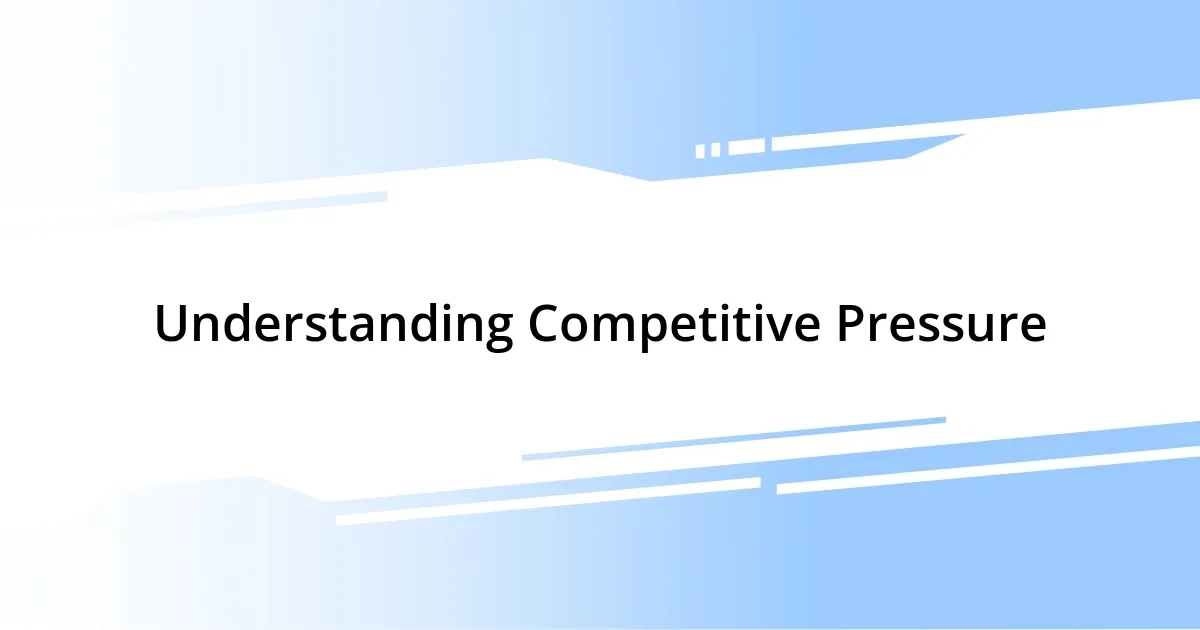
Understanding Competitive Pressure
Competitive pressure can feel like a double-edged sword. I remember back in college, the feeling of my heart racing as I prepared for final exams alongside peers who seemed to thrive under stress. I often wondered, “Why do some people flourish while others crumble?” That question drove me to understand that competitive pressure can actually motivate us to perform better if we learn how to manage it.
There are different types of competitive pressure, and each can trigger various responses. Sometimes, it’s exhilarating to push past your limits, but other times, it can lead to crippling anxiety. I recall a sports competition where the pressure mounted not just from my team but from my own expectations. That experience taught me that recognizing when pressure is healthy versus when it’s overwhelming is key to navigating these intense feelings.
On a deeper level, I believe competitive pressure can unearth insecurities we didn’t even know existed. Have you ever faced a competitor who made you question your abilities? I certainly have. Those moments felt overwhelming, but they prompted me to reflect on my strengths and weaknesses. Understanding that competitive pressure brings forth both challenges and opportunities for growth has helped me transform my approach to competition.

Recognizing Your Triggers
Recognizing your triggers is essential in managing competitive pressure. I’ve noticed that my heart rate spikes not only in physical contests but also during presentations or group discussions. Each time I felt that rush, I took a moment to pause and pinpoint what led to it. Was it the need to impress? Or perhaps the fear of failure? For me, identifying these triggers was a revelation that helped me to manage my reactions more effectively.
Here are some common triggers that can escalate competitive pressure:
- Comparative thinking: When I start measuring my achievements against others, it often leads to stress.
- Fear of judgment: The worry about how peers perceive my performance can be overwhelming.
- Perfectionism: My desire to deliver flawless results often heightens my anxiety.
- Past experiences: Reflecting on previous competitions where I felt inadequate can resurface old fears.
- High stakes: Situations that carry significant personal or professional consequences amplify my feelings of pressure.
By being mindful of these triggers, I’ve found it much easier to approach competitive situations with a healthier mindset.
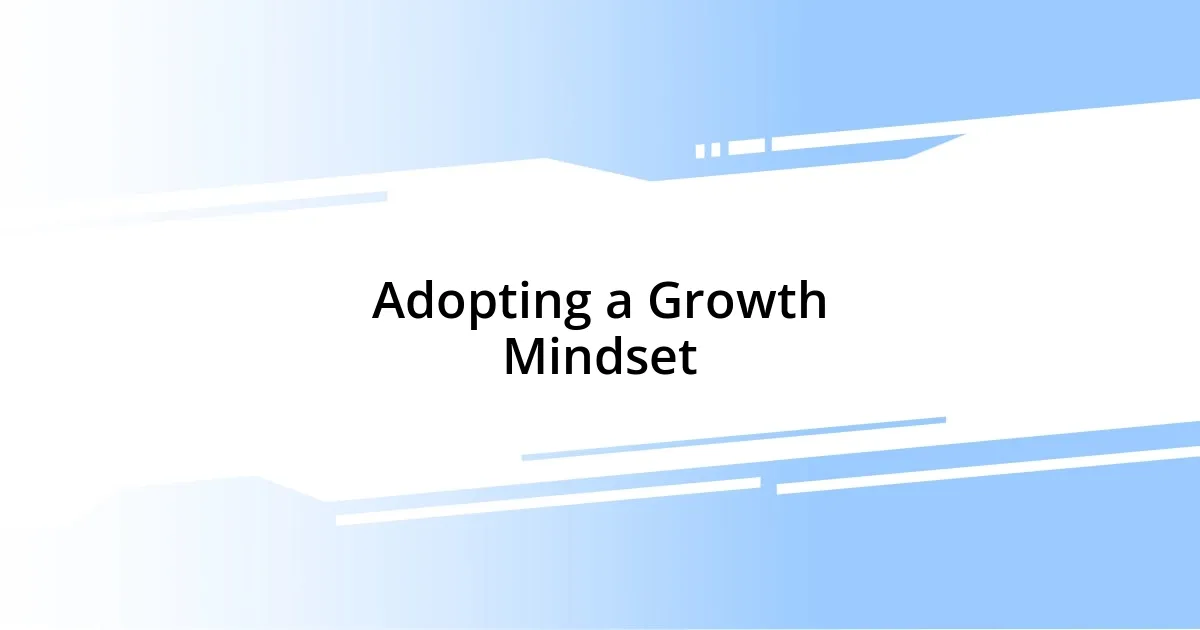
Adopting a Growth Mindset
Adopting a growth mindset has been a game changer for me in dealing with competitive pressure. Instead of viewing challenges as threats, I learned to see them as opportunities for learning and improvement. There was a time when I narrowly missed a promotion at work; instead of feeling defeated, I reflected on that experience. What skills could I develop? What strategies could I adopt? Shifting my perspective allowed me to turn that setback into a stepping stone for future success.
One powerful insight I gained was the importance of embracing mistakes. I remember when I flubbed a significant presentation in front of my colleagues. In the past, I might have wallowed in embarrassment, but instead, I asked for feedback. That experience taught me that mistakes aren’t just pitfalls; they’re valuable lessons that drive growth. Each stumble became a chance to enhance my skills rather than a reason to fear competition.
In practice, cultivating a growth mindset means celebrating the progress of others alongside my own. During a recent workshop, I watched a teammate excel, and instead of feeling jealous, I felt inspired. I thought, “What can I learn from their approach?” This mentality has made competition feel less like a threat and more like a collaborative journey. Each victory, whether mine or someone else’s, contributes to my growth.
| Fixed Mindset | Growth Mindset |
|---|---|
| Avoids challenges | Embraces challenges |
| Gives up easily | Persist through setbacks |
| Sees effort as fruitless | Sees effort as a path to mastery |
| Ignores feedback | Welcomes feedback as a tool for growth |
| Feels threatened by others’ success | Finds inspiration in others’ success |
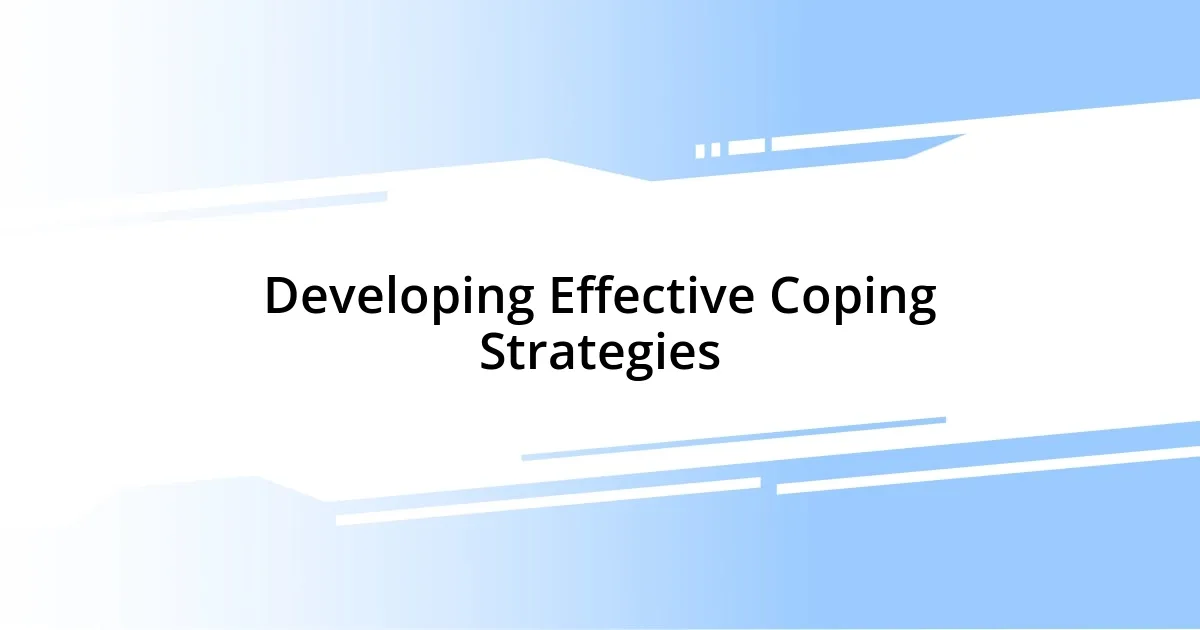
Developing Effective Coping Strategies
Coping with competitive pressure requires a toolkit of strategies that resonate personally. One approach I found effective was establishing a routine that includes mindfulness exercises, like deep breathing. On days filled with deadlines, taking just a few moments to center myself helps clear my mind. I often wonder, have you ever tried pausing during a stressful moment? It can truly change the game.
Another strategy I’ve embraced is positive self-talk. I recall preparing for a major sports event, feeling the weight of past performance hanging over me. Instead of spiraling into doubt, I began to affirm my strengths: “I am prepared, I am capable.” Revisiting that moment makes me realize how powerful our inner dialogue can be in reshaping our experience of pressure.
Finally, I believe in the importance of building a support network. Surrounding myself with people who understand competitive pressures has been invaluable. One particular friend, who shares similar struggles, encourages me to share my fears openly. This exchange not only eases my burden but also clarifies my thoughts. Isn’t it comforting to know you’re not alone in this? Having someone to lean on can turn competitive moments into shared challenges, making the journey a little less daunting.
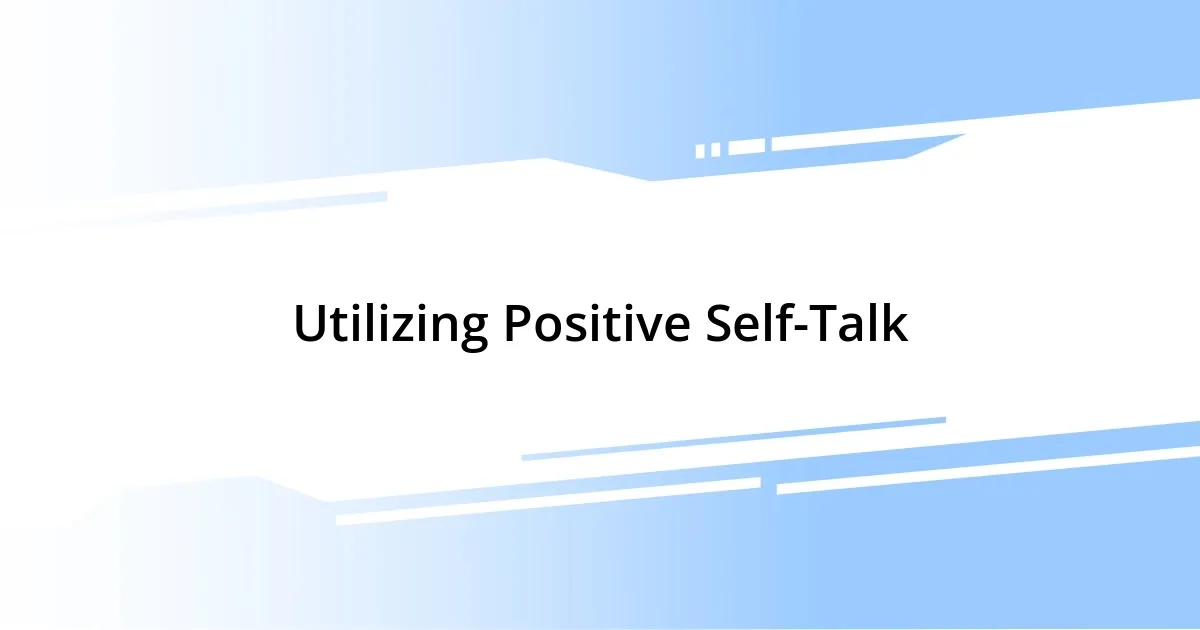
Utilizing Positive Self-Talk
In my journey to harness competitive pressure, I found that positive self-talk truly transformed my mindset. I vividly recall a situation before a crucial job interview where my anxiety began to spiral. Rather than allowing those negative thoughts to take hold, I stopped and reminded myself, “I have this! I bring valuable skills to the table.” That shift in my internal dialogue changed my energy entirely, making me feel more confident and capable.
There have been instances when doubt would creep in, especially before big presentations. I remember standing backstage, heart racing, replaying lines in my head. Instead of succumbing to fear, I chose to say affirmations aloud—“I’ve practiced this; I know my material.” Those words became a mantra, grounding me and amplifying my belief in myself. I often ask others, “Have you ever used voices in your head as fuel rather than as a hindrance?” It’s enlightening to see how self-talk can morph from a source of anxiety to a pillar of strength.
I also realized that surrounding myself with affirming voices is vital. When I hear a colleague say, “You’ve got great insights to share,” it resonates deeply, reinforcing what I already aim to believe. I’ve learned that positive self-talk isn’t just a solitary effort; it thrives in an environment of encouragement. How often do we overlook the power of the words we choose, both to ourselves and from those around us? Embracing this practice has made navigating competition feel more exhilarating than exhausting.
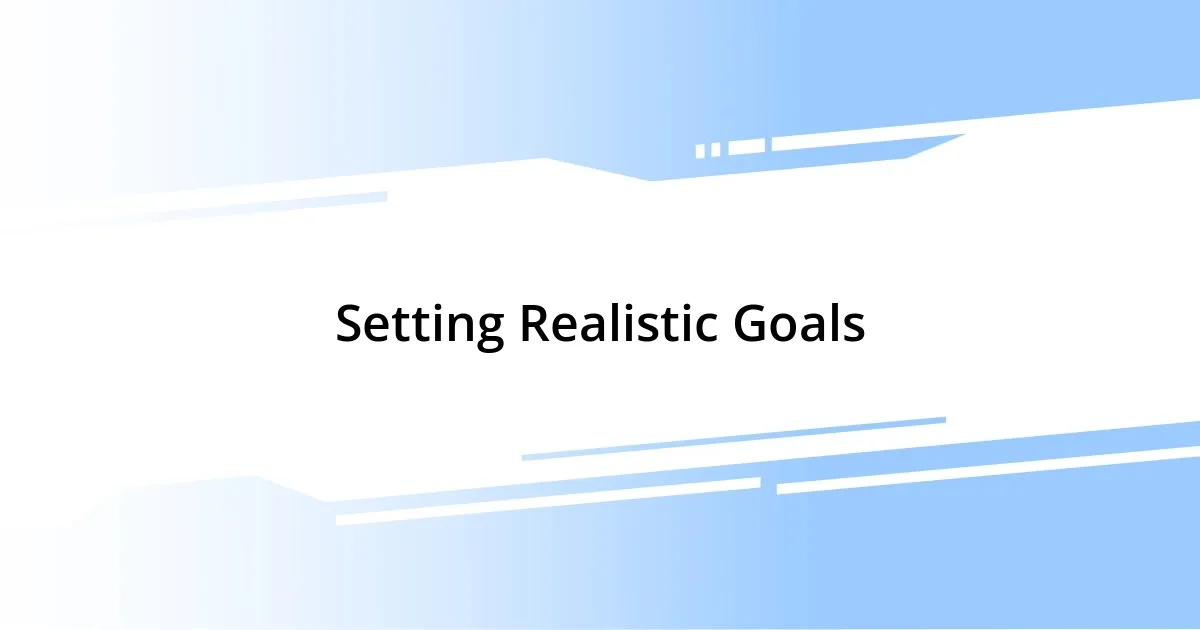
Setting Realistic Goals
Setting realistic goals has been a game changer for me when dealing with competitive pressure. I remember a time when I aimed too high for a fitness milestone and quickly felt overwhelmed. Instead of celebrating small victories, I just kept focusing on that unattainable target. It hit me that breaking goals into achievable steps could relieve a lot of that pressure. Have you ever felt the weight of expectations holding you back? I found that restructuring my goals to be more attainable gave me a clearer path forward.
One memorable experience I had was preparing for a marathon. Initially, I aimed to run 26 miles without proper training and ended up feeling discouraged when I couldn’t even hit 10. It was then I decided to set incremental goals, like running 10% further each week. With this approach, I discovered a sense of accomplishment each time I hit a new target. There’s nothing quite like ticking off those smaller milestones to keep up motivation, right?
Inspiringly, setting clear and realistic goals also helps to foster self-compassion. During a particularly challenging week, I found myself beating myself up over missed training sessions. However, when I took a step back and acknowledged my efforts, focusing on simply doing my best rather than perfection, I found peace in my journey. That realization has stuck with me, encouraging me to cultivate a more gentle approach toward my limits. It’s fascinating to see how redefining goals can shift our perspective, isn’t it?
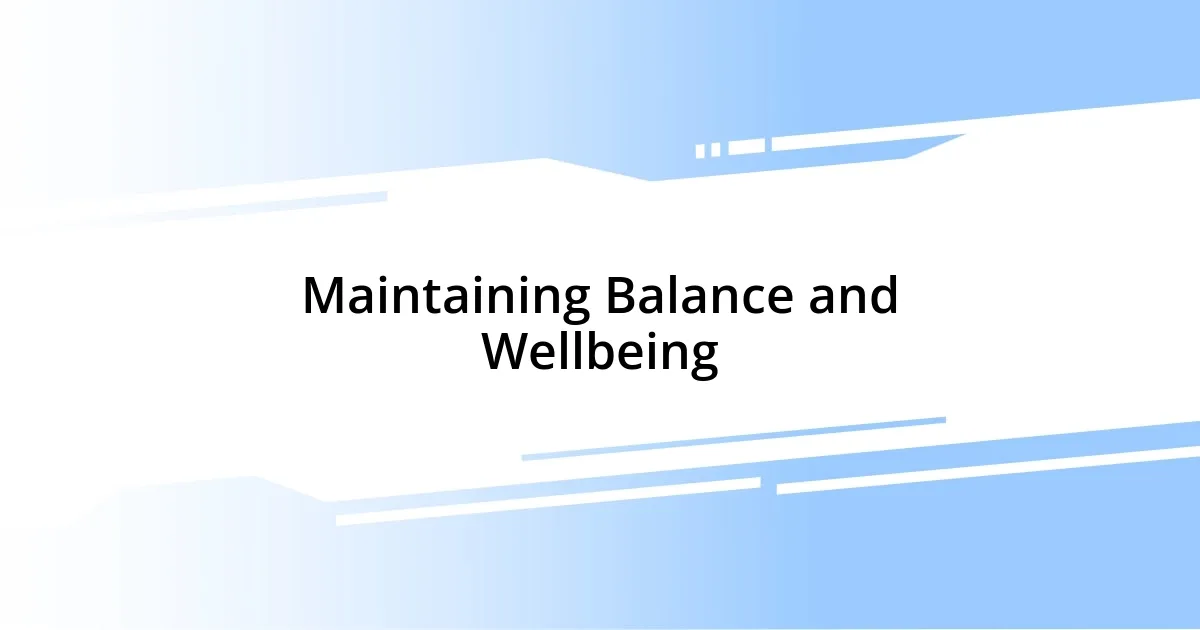
Maintaining Balance and Wellbeing
Maintaining balance and wellbeing has always been an essential part of my strategy for dealing with competitive pressure. I vividly remember a particularly tense week during finals season where I felt pulled in every direction—study sessions, group projects, and endless caffeine. When it all became too overwhelming, I took a step back to prioritize my mental health. I started scheduling regular breaks for myself, even if it was just a brisk walk around the block. I often wondered, “How can I perform at my best if I’m running on empty?” This realization helped me maintain my energy and focus, turning potentially stressful moments into opportunities for self-care.
One evening, after a long day of juggling presentations and deadlines, I felt the stress seeping into my personal life. It struck me that I needed to carve out time for things I loved—like painting or simply immersing myself in a good book. I asked myself, “When was the last time I truly enjoyed a moment without stress looming?” Making room for those passions allowed me to recharge my creativity and resilience. Engaging in activities that sparked joy not only lightened my mood but also sharpened my focus when I returned to more demanding tasks.
Moreover, I learned that prioritizing wellbeing also includes managing my social life. I found that surrounding myself with positive, supportive friends created a buffer against competitive stressors. One memorable night spent laughing with friends over dinner reminded me how essential it is to connect with others. I’ve realized relationships can provide emotional strength; they help me process my feelings rather than bottling them up. Have you ever considered how your social interactions influence your state of mind? This understanding has been vital for my balance—proving that sometimes, the best support comes from the people we share our lives with.












